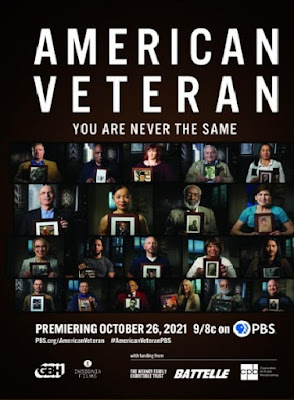There was a time when just about everyone worked with at least one veteran on their offices or factories. Often, there would be considerably more than one. This was even still true during the years following the Vietnam War, but the shift to an all-volunteer military also led to an unanticipated social and cultural divide. Bridging the gap between veterans and civilians is clearly one of the missions of the four-part American Veteran, which begins this Tuesday on PBS.
Each episode corresponds to a period of service, hosted (via off-camera narration) by prominent veterans. Although there is supplemental historical context going back to the Revolutionary War, the primary focus falls on veterans of WWII through Iraq and Afghanistan. Perhaps the best episode is “The Crossing,” hosted by Marine Corp vet Drew Carey, because it explains the basic training experience, which civvies probably only know from films, like An Officer and a Gentleman. Although Carey served during peace-times, he credits his tenure with making him at his subsequent show business career.
Sen. Tammy Duckworth hosts “The Mission,” which explores the dangers of deployment, both physical and mental. She certainly has the standing to do so, since she was seriously wounded during an RPG attack by Iraqi insurgents. However, it would have been nice to also hear from a GOP veteran like Rep. Dan Crenshaw at some point during the series, even though there is little in her commentary that is overtly political. Regardless, the undeniable emotional crescendo of the episode comes from a WWII Coast Guard veteran, who tearfully recounts his D-Day experience shuttling troops to the carnage on the beaches on an amphibian landing craft.
“The Return,” hosted by actor Wes Studi, examines the challenges of homecoming. We hear a great deal about recent veterans’ struggles with PTSD, but to the credit of writers Stephen Ives and Gene Tempest, this installment also acknowledges the scorn and hostility directed at returning Vietnam veterans by New Left activists.
At some times, it seems like American Veterans compulsively airs out the American military’s dirty laundry, especially when it comes to sexual assault and past discrimination. This is particularly true of the final episode, “The Reckoning,” which generally observes the lingering influence of military service on veterans as the chart their post-service lives. J.R. Martinez is a fitting choice to host, since he has built a successful career as an actor and motivational speaker that he probably never expected when serious burn injuries ended his Army service. However, “The Reckoning” also gives the U.S. military credit for being ahead of society in some of its efforts, as when it racially integrated in 1948.
There is a gap in society between those who served and those who did not. As one veteran observes, we are seeing military service becoming a “family business,” leading to the development of a “warrior caste.” In general, all American Veteran’s talking heads still agree an all-volunteer military is a good thing, but there are unintended consequences that nobody has yet to address.
There are indeed some important points raised in the series. Most likely, it was completed before the disastrous withdrawal from Afghanistan, which prompted outrage from many veterans when the Afghan contractors they worked and fought with were left behind. One can imagine they could provide a rather pointed post-script. On the other hand, Aron Gaudet’s The Way We Get By, documenting the "welcome home" greeters in the Bangor International Airport, who volunteer at all hours of the night (referenced at some length in AV), would make a poignant companion film. Highly recommended for civilians, American Veteran starts this Tuesday (10/26) on PBS.

